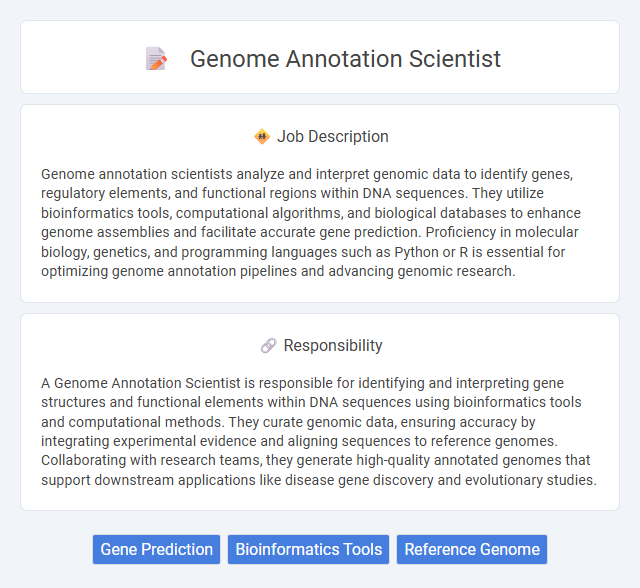
Genome annotation scientists analyze and interpret genomic data to identify genes, regulatory elements, and functional regions within DNA sequences. They utilize bioinformatics tools, computational algorithms, and biological databases to enhance genome assemblies and facilitate accurate gene prediction. Proficiency in molecular biology, genetics, and programming languages such as Python or R is essential for optimizing genome annotation pipelines and advancing genomic research.
Individuals with strong analytical skills and a passion for genetics will likely find a career as a genome annotation scientist suitable. Those comfortable working with bioinformatics tools and interpreting complex genetic data probably have a good chance of success in this role. People who prefer structured tasks and continuous learning about genomic technologies might be more inclined to thrive in this field.
Qualification
Genome annotation scientists require advanced degrees in bioinformatics, molecular biology, or computational biology, often holding a Master's or Ph.D. Proficiency in programming languages like Python and R, along with expertise in sequence alignment tools and genomic databases, is essential. Strong analytical skills and experience with genome assembly, gene prediction, and functional annotation pipelines are critical for success in this role.
Responsibility
A Genome Annotation Scientist is responsible for identifying and interpreting gene structures and functional elements within DNA sequences using bioinformatics tools and computational methods. They curate genomic data, ensuring accuracy by integrating experimental evidence and aligning sequences to reference genomes. Collaborating with research teams, they generate high-quality annotated genomes that support downstream applications like disease gene discovery and evolutionary studies.
Benefit
Engaging in a Genome Annotation Scientist role may offer opportunities to drive advancements in genetic research, potentially improving personalized medicine and disease understanding. The position could provide access to cutting-edge bioinformatics tools and collaborative projects with leading research institutions. Professionals might also experience career growth through contributions to innovative genomic databases and publications.
Challenge
Genome annotation scientists likely face challenges related to managing large volumes of complex genomic data, requiring advanced computational skills and biological knowledge. The job probably demands continual adaptation to evolving technologies and algorithms to accurately identify gene functions and regulatory elements. Balancing accuracy with efficiency in interpreting genomic sequences may present ongoing difficulties in this role.
Career Advancement
Genome annotation scientists advance by mastering bioinformatics tools, enhancing skills in data analysis, and contributing to high-impact research projects. Progression often involves moving into senior positions, leading genome annotation teams, and collaborating on large-scale genomic initiatives. Continuous learning of emerging technologies in genomics and computational biology significantly boosts career growth opportunities.
Key Terms
Gene Prediction
Genome annotation scientists specializing in gene prediction utilize bioinformatics tools and algorithms to identify coding regions and functional elements within DNA sequences. They interpret genomic data to distinguish between protein-coding genes, regulatory sequences, and non-coding RNAs, enabling accurate mapping of genetic information. Proficiency in machine learning models and comparative genomics techniques is essential for enhancing the precision of gene prediction in complex genomes.
Bioinformatics Tools
Genome annotation scientists utilize advanced bioinformatics tools such as BLAST, Augustus, and MAKER to analyze and interpret genomic sequences, identifying genes and regulatory elements with precision. Expertise in software platforms like Gene Ontology (GO) databases and Ensembl enhances functional annotation, enabling comprehensive characterization of genetic data. Proficiency in programming languages like Python and R supports automation and customization of genome annotation pipelines, optimizing data analysis workflows.
Reference Genome
Genome annotation scientists specializing in reference genomes analyze and interpret genomic data to identify genes, regulatory elements, and structural variants within a high-quality reference sequence. They employ bioinformatics tools and comparative genomics to refine annotations, improving the accuracy of gene models and functional predictions. Their work supports advancements in genetics, evolutionary biology, and personalized medicine by providing essential insights into genome structure and function.
 kuljobs.com
kuljobs.com